
The province of Grosseto is a province in the Tuscany region of Italy. Its capital is the city of Grosseto. As of 2013 the province had a total population of 225,098 people.
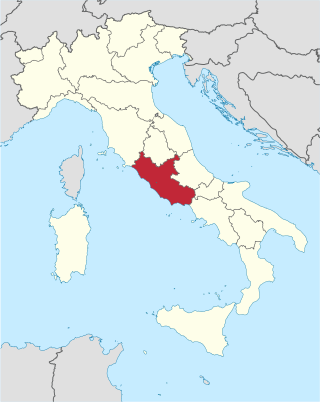
Lazio or Latium is one of the 20 administrative regions of Italy. Situated in the central peninsular section of the country, it has 5,714,882 inhabitants and a GDP of more than €212 billion per year, making it the country's second most populated region and second largest regional economy after Lombardy. The capital of Lazio is Rome, which is also the capital and largest city of Italy, and completely encircles Vatican City.

Manciano is a town and comune in the southern part of the province of Grosseto, Tuscany, central Italy. It has a population of about 7,200.

The House of Farnese was an influential family in Renaissance Italy. The titles of Duke of Parma and Piacenza, Duke of Latera and Duke of Castro were held by various members of the family.

Lake Mezzano is a small crater lake of central Italy, of volcanic origin, which was formed 400,000 years ago.
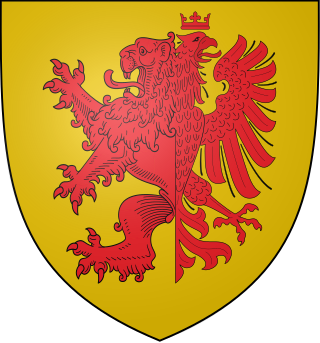
The Aldobrandeschi family was an Italian noble family from southern Tuscany.
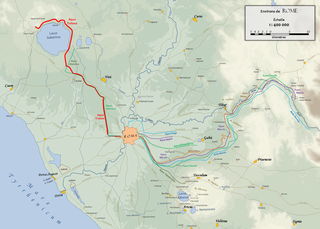
The Aqua Traiana was a 1st-century Roman aqueduct built by Emperor Trajan and inaugurated in 109 AD. It channelled water from sources around Lake Bracciano, 40 km (25 mi) north-west of Rome, to ancient Rome. It joined the earlier Aqua Alsietina to share a common lower route into Rome.
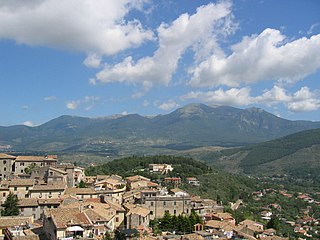
The Monti Ernici are a mountain range in central Italy, part of the sub-Apennines of Lazio. They are bounded by the valley of the river Aniene to the north-east, that of the Liri to the east, and, from south to west, by the valleys of the Cosa and Sacco. They are the natural border between two central Italian regions, Lazio and Abruzzo.

The County of Santa Fiora, also known as State of Santa Fiora was a small historical state of southern Tuscany, in central Italy. Together with the county of Sovana, it was one of the two subdivisions into which the possessions of the Aldobrandeschi, then lords of much of southern Tuscany, were split in 1274.

The Duchy of Castro was a fiefdom in central Italy formed in 1537 from a small strip of land on what is now Lazio's border with Tuscany, centred on Castro, a fortified city on a tufa cliff overlooking the Fiora River which was its capital and ducal residence. While technically a vassal state of the Papal States, it enjoyed de facto independence under the rule of the House of Farnese until 1649, when it was subsumed back into the Papal States and administered by the House of Stampa di Ferentino.
Lago del Tafone is a lake in the Province of Grosseto, Tuscany, Italy. It is located between the Albegna and Fiora hills and the Maremma, downstream from the Rocca di Montauto and not far from the border with Lazio. Since 1996, it has been partially included in the protected areas of the Montauto nature reserve.
Bianco di Pitigliano is a denominazione di origine controllata that is located close to the southern coast of Tuscany, in Italy. The DOC was created in 1966.
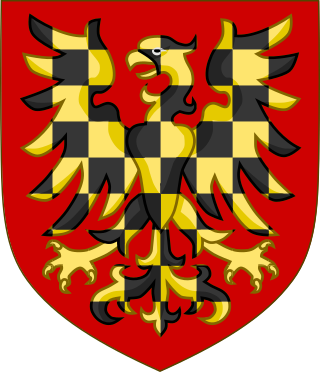
The counts of Segni were an important noble family of medieval and early modern Italy originating in Segni, Lazio. Many members of the family acted as military commanders or ecclesiastical dignitaries, including many cardinals and four popes.

Bagnolo is a village in Tuscany, in central Italy. It is administratively a frazione of the comune of Santa Fiora, province of Grosseto. At the time of the 2001 census, its population amounted to 566.

Bagnore is a village in Tuscany, central Italy, administratively a frazione of the comune of Santa Fiora, province of Grosseto. At the time of the 2001 census its population amounted to 420.

Pescia Fiorentina is a village in Tuscany, central Italy, administratively a frazione of the comune of Capalbio, province of Grosseto. At the time of the 2001 census, its population amounted to 37.

Poggio Murella is a village in Tuscany, central Italy, administratively a frazione of the comune of Manciano, province of Grosseto. At the time of the 2011 census its population amounted to 287.

San Martino sul Fiora is a village in Tuscany, central Italy, administratively a frazione of the comune of Manciano, province of Grosseto. At the time of the 2001 census its population amounted to 224.

















